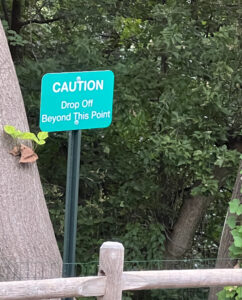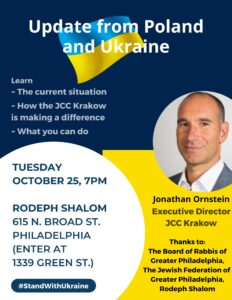 Caution
Caution
Drop off Beyond this Point!
Our synagogue is built into the side of a large steep hill. We have a beautiful ya’ar, a cleared garden-Forrest area where we can pray surrounded by the beauty of nature. Our Rosh Hashannah morning service was more meaningful in this beautiful space.
We gathered at the edge of the garden to listen to the Shofar; the wood fence kept us from the drop-off into the lush wooded vale below. And the sign said, “Caution, Drop off Beyond this Point.”
To those of a certain age, it is reminiscent of the 1971 song by the Five Man Electric Band, Sign, Sign, Everywhere a Sign. But our sign was not about keeping others out; our sign was about protecting us, keeping us safe from falling and getting hurt. But there is a metaphorical message. What do you take with you when you leave the sacred space and descend back into the regular and mundane?
I imagine such a sign would have been appropriate at the Temple Mount. When you ascended, you performed many rituals and experienced those special moments within the sacred and holy space. Such a sign would serve as notice that descending and leaving the sacred Temple’s ground carried risks. How much of the divine and sacred would you take with you?
I vividly recall walking along the southern ramparts of the Old City walls. To the right was the interior space of Jerusalem and the Temple Mount above; to the left, the bottom of the wall and valley so far below. I walked the narrow path remembering the line from Deuteronomy, “I give you a choice between life and death….” To the right was the sacred Mount, and to the left was a long fall to the bottom. It was harrowing, but I safely found my way to the stairs and ground level. But what did I take with me?
It is easy to be swept up and immersed within sacred, holy spaces and moments. But when we go back out into the world is the actual test of how much that particular special time changed us. Jacob encountered the Angel and God, emerging forever changed, with a new name and a new mission as our Patriarch. Moses was forever changed after the encounter with the burning bush. He left that place forever changed, taking the holiness he encountered with him to lead his people. Can our sacred encounters serve as a place for personal nurture and an opportunity to bring holiness with us back into the world? Caution, Drop off beyond this point is the sign letting us know we can be safe if we carry the sacred from our metaphorical hilltop to the world below.
And the sign said
“Everybody welcome
Come in, kneel down and pray.”
But when they passed around the plate at the end of it all
I didn’t have a penny to pay
So I got me a pen and a paper
And I made up my own little sign
I said, “Thank you, Lord, for thinkin’ ’bout me
I’m alive and doin’ fine”
Shabbat Shalom





